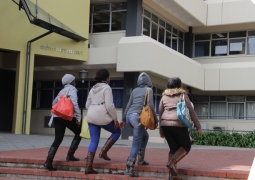
The Portfolio Committee on Higher Education, Science and Innovation met with the Minister of Higher Education, Science and Innovation; the Departments of Higher Education Science and Innovation, and Higher Education and Training; heads of public institutions of higher learning; and technical and vocational education and training (TVET) colleges; national student representative councils; and the National Student Financial Aid Scheme (NSFAS) yesterday to discuss the state of readiness for the 2022 academic year.
The committee also received briefings from the Universities South Africa, the South African Public Colleges Organisation, the South African Union of Students and the South African Technical and Vocational Education and Training Students Association on preparations for the 2022 academic year. The committee welcomed all the stakeholders’ 2022 academic year readiness plans.
The Chairperson of the committee, Ms Nompendulo Mkhatshwa, implored all the stakeholders to work hand-in-hand from national to campus level, and ensure communication between students’ representatives councils and management of institutions to “ensure a seamless start to the academic year”.
She was, however, concerned about some universities’ vaccination mandate plans for students and staff. Ms Mkhatshwa warned that the decisions to enforce mandatory vaccinations might be challenged by students who could take their rejection of that decision to the streets, given inadequate consultations with all stakeholders.
“We need to involve the students in these plans to mitigate any chances of them taking their discontent to the streets – consultation is key,” she said.
The committee welcomed the NSFAS presentation, which suggests that “we are on the right track and touches on real issues, it looks like we are likely to see less protests in the institutions of higher learning in the new academic year”. The committee told NSFAS that the majority of students in the higher education system are NSFAS-funded. It is therefore important for the scheme to be stable at all times and avoid any threat to collapse the entire sector.
The Chairperson of the NSFAS board, Mr Ernest Khosa, assured the committee that the scheme will try its best to align with South Africa’s objective to provide access to education. “We are aware that NSFAS is an important intervention tool for access to higher education and if we make a mistake there will be instability. We will make sure that the streets are spared from too many activities,” added Mr Khosa. The scheme, he said, plans to prosecute parents who lie about their financial status in order to secure NSFAS funding for their children.
The student union said it would like to see a smooth beginning for the new academic year, which will be informed by cooperation amongst all stakeholders. The students are opposed to the proposed mandatory vaccination by some varsities, but still encourage their members to vaccinate.
“SAUS is unequivocally opposed to mandatory vaccinations by institutions of higher learning. Students and workers must be afforded their constitutional rights to determine and choose to vaccinate. We denounce and condemn the decision taken by various institutions in making the vaccines mandatory,” said SAUS Secretary-General Mr Lukhanyo Daweti.
The Director-General of the Department of Higher Education and Training, Dr Nkosinathi Sishi, also told the committee that they envisage that the 2022 academic year will not be characterised by delays, as occurred at the beginning of the 2021 academic year. “We have learnt lessons from the past; the sector is ready for 2022, but there is still work to be done to tighten our plans,” he said.
The department and the universities told the committee about the need to work closely with quality assurance bodies to ensure the rest of the world has confidence in the qualifications that they issue.
The Minister of Higher Education, Science and Innovation said protocols have been developed to deal with the COVID-19 pandemic, which continues to be a major challenge to the operations of the Department and its institutions.
Ms Mkhatshwa noted that funding for the PSET sector is still a major challenge, especially the envisaged budget shortfall for NSFAS for the 2022 academic year and funding for the “missing middle” students. She requested the department’s Director-General to update the committee on the outcome of their engagements with National Treasury. She further requested NSFAS to update the committee on the outcomes of the ongoing consultations on the bursary guidelines for the 2022 academic year.
In closing, Ms Mkhatshwa implored the department to expedite the finalisation of the 2022 fee increase and communicate the decision to universities so that parents of the students who are self-funded and sponsors are informed earlier of the increase in tuition and accommodation fees.
Sakhile Mokoena
2 December 2021

